高一英语必修一unit3教案
Unit 3 Sports and Fitness Listening and 高一英语 必修一教案
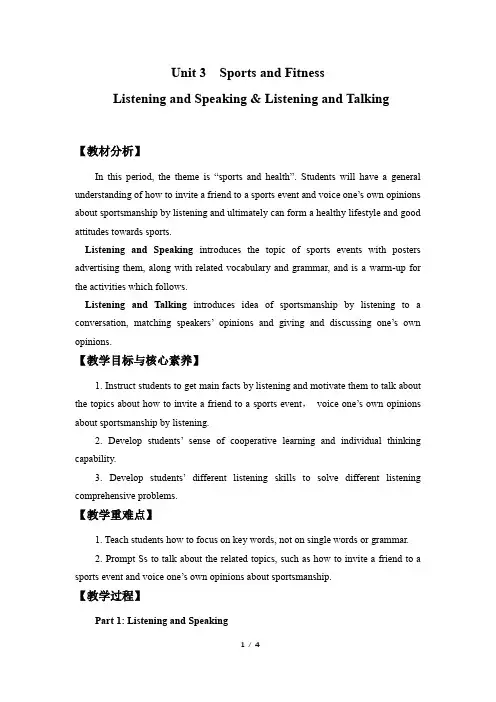
Unit 3 Sports and FitnessListening and Speaking & Listening and Talking【教材分析】In this period, the theme is “sports and health”. Students will have a general understanding of how to invite a friend to a sports event and voice one’s own opinions about sportsmanship by listening and ultimately can form a healthy lifestyle and good attitudes towards sports.Listening and Speaking introduces the topic of sports events with posters advertising them, along with related vocabulary and grammar, and is a warm-up for the activities which follows.Listening and Talking introduces idea of sportsmanship by listening to a conversation, matching speakers’ opinions and giving and discussing one’s own opinions.【教学目标与核心素养】1. Instruct students to get main facts by listening and motivate them to talk about the topics about how to invite a friend to a sports event,voice one’s own opinions about sportsmanship by listening.2. Develop students’ sense of cooperative learning and individual thinking capability.3. Develop students’ different listening skills to solve different listening comprehensive problems.【教学重难点】1. Teach students how to focus on key words, not on single words or grammar.2. Prompt Ss to talk about the related topics, such as how to invite a friend to a sports event and voice one’s own opinions about sportsmanship.【教学过程】Part 1: Listening and SpeakingLead inThe teacher is advised to talk with their students about sports events.Boys and girls, look at the posters on p36, what sports events do you like to watch? Which sports would you like to try? After their small talk, the teacher can move on by finishing the following listening task:Play conversation 1 which is about Shen Qi’s main purpose for talking to Amy and after finishing listening for the first time, the students need to solve the following tasks.1. Purpose________________________________________________________2. Listen to conversation 1 again and write down the words that the speaker stresses: ______________________________________________________________After finishing the task above, the teacher is expected to play conversation 2 which is about Adam’s inviting Julie to a sports event and after finishing listening, the students need to solve the following task.Listen to Conversation 2. Then answer the following questions:1. When will the event happen?The event will happen___________________________________________________2. What's a "Blue Paint" run?A "Blue Paint" run is a fun run that_________________________________________3. Why is it called a "Blue Paint" run?Because people can buy water ballons flled with __________ and __________ the runners.4. If 200 people take part in the run and 400 balloons are sold, how much money will they collect?_____________________________________________________________________ Finally, after finishing the task above, the teacher is expected to instruct students to work in groups to finish the following project:Speaking ProjectWhat event or activity would you like to invite your friend to? Make a conversation with a partner.Ski Race: Zhangjiakou, a beautiful city in northern China, will host the Youth Ski Race in December.Track Meet: a great event for track –and –field lovers on 26 October.Gym Class: come and work out at a gym! You can make it.Part 2: Listening and Talking:The teacher is advised to talk with their new students about the related topic:Boys and girls , what do you think of sportsmanship? Let’s listen and find out: Play the listening and match each opinion with the right speaker. Who do you agree with? Why?Cao Jing _____________ Lily _____________ Max _____________A. An athlete should do his/her best to win.B. The girl should stop and help the other girl. Good sportsmanship is more important than wining!C. An athlete should think about honor and his/her fans if he/she is competing for his/her country.Talking projectWork in groups. Choose one of the situations below and make a conversation:●A soccer player should not pretend to fall down even if it helps his/her team.●In school teams, everyone should get a chance to play, not only the best players.●It is wrong to pay people millions of yuan to play sports.●Athletes should play only for their own country.EXAMPLEA: I agree with the idea that a soccer player should never pretend to fall down even if it helps his or her team. You should never cheat.B: Exactly! It's important to do the right thing.C: Well, don't think so. Many players do it, and they think it helps their team to win. A: That doesn't make any sense!B: I see what you mean, but the audience wants fair play.。
译林版高一英语必修第一册(2019版)_Unit3_Extended_reading_公开课教案
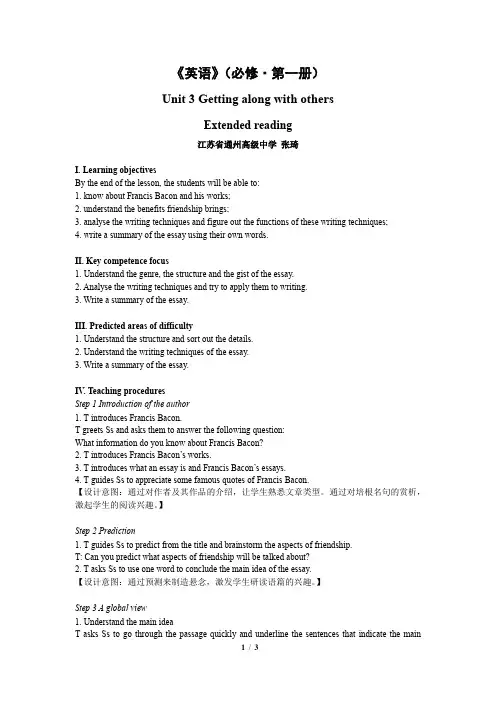
《英语》(必修·第一册)Unit 3 Getting along with othersExtended reading江苏省通州高级中学张琦I. Learning objectivesBy the end of the lesson, the students will be able to:1. know about Francis Bacon and his works;2. understand the benefits friendship brings;3. analyse the writing techniques and figure out the functions of these writing techniques;4. write a summary of the essay using their own words.II. Key competence focus1. Understand the genre, the structure and the gist of the essay.2. Analyse the writing techniques and try to apply them to writing.3. Write a summary of the essay.III. Predicted areas of difficulty1. Understand the structure and sort out the details.2. Understand the writing techniques of the essay.3. Write a summary of the essay.IV. Teaching proceduresStep 1 Introduction of the author1. T introduces Francis Bacon.T greets Ss and asks them to answer the following question:What information do you know about Francis Bacon?2. T introduces Francis Bacon’s works.3. T introduces what an essay is and Francis Bacon’s essays.4. T guides Ss to appreciate some famous quotes of Francis Bacon.【设计意图:通过对作者及其作品的介绍,让学生熟悉文章类型。
优质人教版必修1高一英语Unit 3 Travel journal 教案
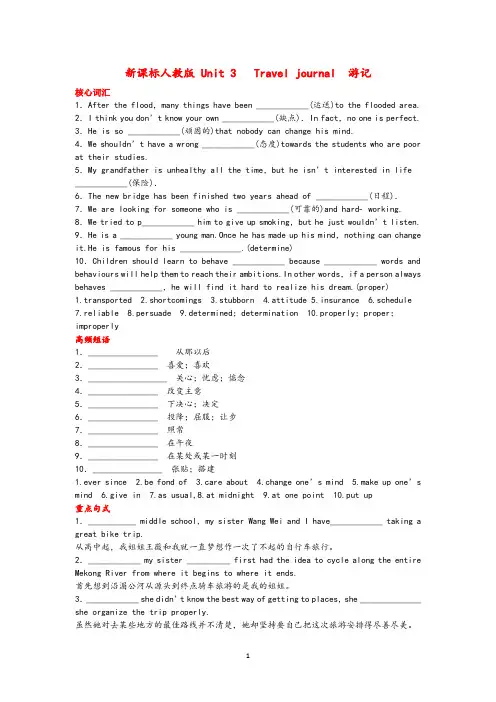
新课标人教版 Unit 3 Travel journal 游记核心词汇1.After the flood,many things have been ____________(运送)to the flooded area. 2.I think you don’t know your own ____________(缺点).In fact,no one is perfect. 3.He is so ____________(顽固的)that nobody can change his mind.4.We shouldn’t have a wrong ____________(态度)towards the students who are poor at their studies.5.My grandfather is unhealthy all the time,but he isn’t interested in life ____________(保险).6.The new bridge has been finished two years ahead of ____________(日程).7.We are looking for someone who is ____________(可靠的)and hardworking. 8.We tried to p____________ him to give up smoking,but he just wouldn’t listen. 9.He is a ____________ young man.Once he has made up his mind,nothing can change it.He is famous for his ______________.(determine)10.Children should learn to behave ____________ because ____________ words and behaviours will help them to reach their ambitions.In other words,if a person always behaves ____________,he will find it hard to realize his dream.(proper)1.transported2.shortcomings3.stubborn4.attitude5.insurance6.schedule7.reliable8.persuade9.determined;determination 10.properly;proper;improperly高频短语1.________________ 从那以后2.________________ 喜爱;喜欢3.__________________ 关心;忧虑;惦念4.________________ 改变主意5.________________ 下决心;决定6.________________ 投降;屈服;让步7.________________ 照常8.________________ 在午夜9.________________ 在某处或某一时刻10.________________ 张贴;搭建1.ever since2.be fond of3.care about4.change one’s mind5.make up one’s mind6.give in7.as usual,8.at midnight9.at one point 10.put up重点句式1.___________ middle school,my sister Wang Wei and I have____________ taking a great bike trip.从高中起,我姐姐王薇和我就一直梦想作一次了不起的自行车旅行。
高一英语必修一 Unit3 Travel Journal 说课稿
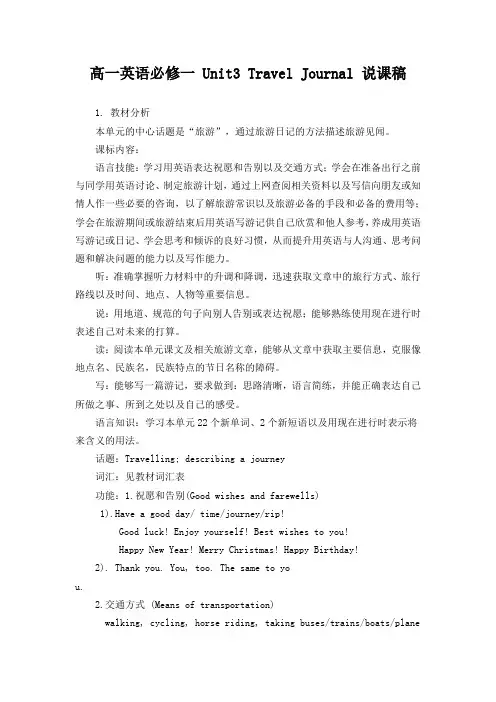
高一英语必修一 Unit3 Travel Journal 说课稿1. 教材分析本单元的中心话题是“旅游”,通过旅游日记的方法描述旅游见闻。
课标内容:语言技能:学习用英语表达祝愿和告别以及交通方式;学会在准备出行之前与同学用英语讨论、制定旅游计划,通过上网查阅相关资料以及写信向朋友或知情人作一些必要的咨询,以了解旅游常识以及旅游必备的手段和必备的费用等;学会在旅游期间或旅游结束后用英语写游记供自己欣赏和他人参考,养成用英语写游记或日记、学会思考和倾诉的良好习惯,从而提升用英语与人沟通、思考问题和解决问题的能力以及写作能力。
听:准确掌握听力材料中的升调和降调,迅速获取文章中的旅行方式、旅行路线以及时间、地点、人物等重要信息。
说:用地道、规范的句子向别人告别或表达祝愿;能够熟练使用现在进行时表述自己对未来的打算。
读:阅读本单元课文及相关旅游文章,能够从文章中获取主要信息,克服像地点名、民族名,民族特点的节日名称的障碍。
写:能够写一篇游记,要求做到:思路清晰,语言简练,并能正确表达自己所做之事、所到之处以及自己的感受。
语言知识:学习本单元22个新单词、2个新短语以及用现在进行时表示将来含义的用法。
话题:Travelling; describing a journey词汇:见教材词汇表功能:1.祝愿和告别(Good wishes and farewells)1).Have a good day/ time/journey/rip!Good luck! Enjoy yourself! Best wishes to you!Happy New Year! Merry Christmas! Happy Birthday!2). Thank you. You, too. The same to you.2.交通方式 (Means of transportation)walking, cycling, horse riding, taking buses/trains/boats/plane语法:现在进行时表示将来When are you leaving?How are you going there?Where are you staying?How long are you staying there?When are you coming back?情感态度和价值观:通过课文的学习,要求同学们能够积极参与关于旅行准备、旅游见闻、旅游感受等方面的交流活动,用准确的英语描述国内外的重要景观、名胜古迹以及一些当地的旅游文化节日。
高一英语教案(说课稿):人教版必修一Unit3 Journey down the Mekong
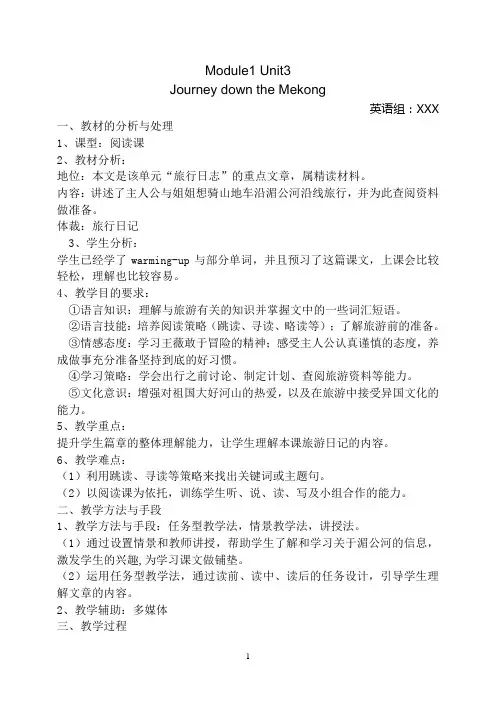
Module1 Unit3Journey down the Mekong英语组:XXX一、教材的分析与处理1、课型:阅读课2、教材分析:地位:本文是该单元“旅行日志”的重点文章,属精读材料。
内容:讲述了主人公与姐姐想骑山地车沿湄公河沿线旅行,并为此查阅资料做准备。
体裁:旅行日记3、学生分析:学生已经学了warming-up与部分单词,并且预习了这篇课文,上课会比较轻松,理解也比较容易。
4、教学目的要求:①语言知识:理解与旅游有关的知识并掌握文中的一些词汇短语。
②语言技能:培养阅读策略(跳读、寻读、略读等);了解旅游前的准备。
③情感态度:学习王薇敢于冒险的精神;感受主人公认真谨慎的态度,养成做事充分准备坚持到底的好习惯。
④学习策略:学会出行之前讨论、制定计划、查阅旅游资料等能力。
⑤文化意识:增强对祖国大好河山的热爱,以及在旅游中接受异国文化的能力。
5、教学重点:提升学生篇章的整体理解能力,让学生理解本课旅游日记的内容。
6、教学难点:(1)利用跳读、寻读等策略来找出关键词或主题句。
(2)以阅读课为依托,训练学生听、说、读、写及小组合作的能力。
二、教学方法与手段1、教学方法与手段:任务型教学法,情景教学法,讲授法。
(1)通过设置情景和教师讲授,帮助学生了解和学习关于湄公河的信息,激发学生的兴趣,为学习课文做铺垫。
(2)运用任务型教学法,通过读前、读中、读后的任务设计,引导学生理解文章的内容。
2、教学辅助:多媒体三、教学过程Step1: Lead inAsk some students to present their dialogue.(The homework of last class)【设计说明】采用对话形式导入,营造出宽松的学习气氛,为学生全面的课堂参与作了铺垫。
Step2: Pre-readingShow students some pictures and maps to know more about the Mekong river, its two names and the route it flows out of China.1. Names: Lancang River and Mekong River2. Route: China-Myanmar-Laos-Thailand-Cambodia-Vietnam-South China sea 【设计说明】利用图片来了解湄公河,为课文第三段做铺垫,同时,激发了学生的兴趣和好奇心。
人教版英语必修一Unit 3(Reading:Journey down the Mekong)教案
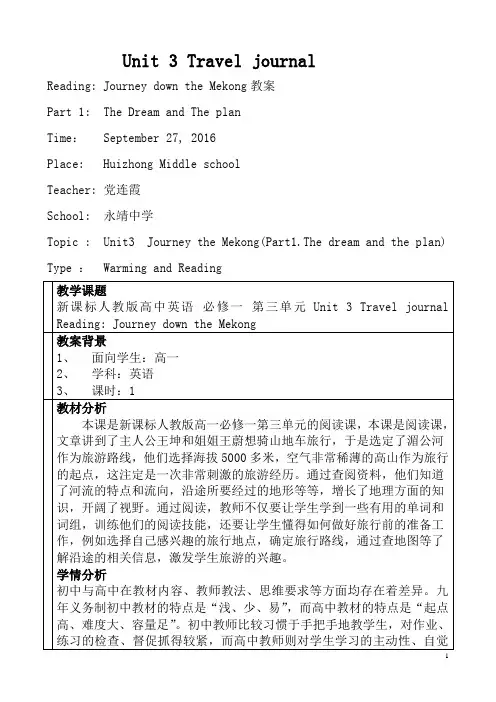
Reading: Journey down the Mekong教案
Part 1:The Dream and The plan
Time:September 27,2016
Place:HuizhongMiddle school
Teacher:党连霞
School:永靖中学
Para. 3The preparations before the trip & details about theMekongRiver.
•Who are Wang Kun and Wang Wei?
•What is their dream?
。Who are Dao Wei and Yu Hang?
4.Sometimes, the river becomes a ________ and enters ____ ______.
5.At last, the river _____ enters the South China Sea.
6.If you travel with them ,you will see all the following except
A. desert B. a waterfall
C. a delta D. a glacier
通过skimming及scanning阅读策略,引领学生关注文本的主题及涉及主题的主要信息。(也是这节课的重点和难点)
Step 4:Summary
Wang Wei and ____.___ have dreamed about ____ a great ___ ___.It was Wang Wei who first had the idea to ____ along the entireMekongRiver. My sister doesn’t ___________ details, because she doesn’t know the best way of getting to places.
高中英语_Unit3 Sports and Fitness教学设计学情分析教材分析课后反思
人教版必修一Unit3 Sports and Fitness教学设计教材分析:该文本选择了两位著名运动员:郎平和迈克尔乔丹。
这一中一外、一男一女两位运动员,不仅在体育方面取得了令人瞩目的成就,而且还具备很多闪光的个人特质与魅力。
郎平作为运动员和教练员都取得过世界冠军,本文着重描述了她的团队合作精神和迎难而上不放弃的坚定决心。
“飞人”乔丹是美国篮球联赛中的常青树,本文着重描述的是他不畏失败、坚持不懈的精神和投身公益事业的热情。
学生不仅崇拜这些体育明星,还应该从这些“模范”身上领会和感悟做人和做事的道理。
这些都是这两个文段的主题意义所在。
学生分析:教学对象为高一学生,他们的认知能力比初中阶段有了进一步的发展,渐渐形成用英语获取信息、处理信息、分析问题和解决问题的能力,在课堂上教师应该多关注他们的思维和表达能力。
通过任务型课堂活动让他们学会阅读技巧,提高阅读能力,也让学生能给主动参与到活动中去,体现学生的主体性并加强合作和交流的能力。
课堂达成目标:1. T o predict the content of the text through pictures and titles2. To develop ability of finding information and apply personal knowledge tostatements about sporting legends3. T o understand the sports spirit deeply教学重难点:Help students improve their ability of cooperation.教学辅助:Interactive whiteboard教学过程:Step 1 Lead-inA guessing gameShow brief introductions of four famous athletes. Students should guess their names.【设计意图】根据英文提示猜人物的游戏激发学生的好奇心,成功引出主题“Living Legends of Sports”。
高中英语:Unit3《Celebration》教案(北师大版必修1)
Unit 3 Festivals一、教材分析1.本课所在的单元的主题Celebration(庆祝)主要是介绍了中外的一些主要的节日,还介绍了人们在一些特殊日子里的庆祝活动。
2.本课Chinese Seasonal Festivals 是本单元的第一课,是一节阅读课。
3.在Warm-up 部分学生通过听力理解已了解了一些关于庆祝的内容及相关词汇,为本课的话题作了一些词汇和内容的铺垫。
4.本课要通过阅读文章被动语态的用法。
二、学生分析1.学生在Warm-up 部分通过听力理解已了解了一些关于庆祝的内容及相关词汇以。
2.学生对本课话题Chinese Seasonal Festivals 已初步具备了一定的背景知识、经历和经验,但是要用英语表达出来还是有一定的难度。
3.高一的学生已初步具备了一定的从语言材料中获取相关语言信息的能力。
三、教学目标基于《课程标准》:“注重提高学生用英语进行思维和表达的能力;形成跨文化交际意识和基本跨文化交际能力.”这一基本要求,达到下列教学目标:1.知识教学点使学生了解和掌握下列知识目标:1)进一步了解我国的一些主要的节日及相关的历史。
2)掌握从文章中获取和处理主要的信息的方法和技巧。
3)掌握介绍节日的基本的篇章结构。
4)学会用英语简单介绍中国的节假日。
使学生掌握下列单词及短语。
(walk along...,take the...turning on the left,catch a bus,need a number 16 bus,I's about a hundred meters along on the right/left)2.教学目标设计A. 语言知识目标:使学生掌握下列单词及短语。
(walk along...,take the...turning on the left,catch a bus,need a number 16 bus,I's about a hundred meters along on the right/left) B.语言技能目标:使学生掌握问路及应答的方法,介绍从家到学校的路线,并能较熟练地指明长春市各大旅游景点的乘车路线。
高一英语必修一unit3教案
高一英语必修一unit3教案第一篇:高一英语必修一unit3教案Unit 3 Travel Journal Period1.Step 1.Warming up 1.Ask some questions:2.Do you often travel? Where have you been?3.2.Following the steps of the warm-up on page 17.Step2.Pre-reading1.Show some traveling pictures of the teacher’s.2.Ask Ss : which river is the longest one in the world and which is the largest one;which river is the longest one in China.3.Ask Ss: how people who live along a river use it.Step3.While-reading1.Scanning: Ss read quickly and answer: What are they going to do?2.Skimming: Ss read again and finish comprehending 1 on page 19.Ss read and get the main ideas of each paragraph.Ss list the countries that the Mekong River flows through.Step4.After-readingSs in pairs and discuss: Wang Wei’s and Wang Kun’s similar and different attitudes about the trip.Similar attitudes about the trip Different attitudes about the trip Both Wang Wei and Wang Kun think…1.Taking this trip is a dreamcome true.2.That they will enjoy this trip a lot.3.They should see a lot of the Mekong.4.That most of the Mekong will be found in Southeast Asia.Wang Wei believes…1.They must start in Qinghai where the river begins /see all of the Mekong.2.That they don’t need to prepare much Wang Kun believes…1.It is too cold and high to start in Qinghai.2.That using an atlas is very important.Step5.Assignment 1.Surf the internet and get more information about the Mekong River.2.Retell the passage use your own words.Period2.Step1.Warming upAsk some Ss to retell the passage that they have learnt last period.Step2.Learning about the languageTeacher explains some language points in the text on page 18.1.Persuade sb.into /out of sth.: cause sb.(not)to do sth.by arguing or reasoning with him 说服或劝说某人(不)做某事He is easily persuaded.Wang Kun couldn’t persuade his sister to change her mind.persuade sb.(that clause): cause sb.to believe sth.;convince sb.使某人信服How can I persuade you that I am telling the truth?2.insist(v.): demand(sth)forcefully, not accepting a refusal 坚持或坚决要求;eg.Since he insisted, I had to stay.insist on sth/doing sth: require or demand;refuse to accept an alternative 一定要(某事物),坚决主张She insists on getting up early and playing her radio loud.3.care about: be worried, concerned or interested 忧虑,关心,惦念don’t you care about anybody? I don’t care about what happens to him.care for /to do: be willing or agree to do sth.;wish or like to do sth.Would you care a drink? Would you care to go for a walk? care for sb.1).Like or love sb.He cares for her deeply.2).Look after sb;take care of sb;be responsible for sb Who will care for your child if you are out?4.Once she has made up her mind, nothing can change it.她一旦下了决心,什么也不能使她改变。
选择性必修第一册教案unit 3
2023-2024学年第一学期高一英语集体教案
(必修三&选择性必修一)
备课组成员:马宜清胡晓楠周正琴李建芳
高亚超田宜新李元秀杜彩云
王菡
授课教师:
授课班级:
Book 1 Unit 3 Conservation
【单元教材分析】
本单元主题语境是“人与自然”,涉及的主题语境内容是环境保护,最终实现人与自然和谐相处。
本单元从听Linda Wei的讲座开始,引入塑料袋对环境的污染,然后又依次讲到犀牛的保护、物种灭绝的原因、后果和对策、Kevin和Alicia对塑料袋包装是否污染的讨论、英国的交通问题及对策以及工厂化养殖的利弊,帮助学生全面了解现阶段存在的人与自然不和谐相处的现状,使学生意识到保护环境,实现人与自然和谐相处的重要性,引导学生提高环保意识,为建设环境友好型社会做贡献。
【单元学习目标】
1.语言能力目标
能够理解人与自然相关的文章内容,听懂并谈论保护环境相关的话题,恰当使用所学词汇、句型描述环境问题和解决对策;能够通过议论文表达自己的观点和看法;能够为保护环境,保护动物提出合理的建议。
2.文化意识目标
能够通过了解人与自然不和谐相处的现状,树立正确的环保意识,为保护环境做贡献。
3.思维品质目标
能够通过比较、分析,准确获取语篇中有关环保问题和解决对策的相关信息,建立对人与自然关系的正确认识,并在此基础上联系自身实际,对环保问题表达自己的见解,提高环保意识,实现知识与思维能力的迁移。
4.学习能力目标
能够通过了解人与自然相处的现状,激发英语学习的兴趣;能够多渠道获取英语学习资源;能够选择恰当的策略与方法,监控、评价、反思和调整自己的学习内容和进程。
- 1、下载文档前请自行甄别文档内容的完整性,平台不提供额外的编辑、内容补充、找答案等附加服务。
- 2、"仅部分预览"的文档,不可在线预览部分如存在完整性等问题,可反馈申请退款(可完整预览的文档不适用该条件!)。
- 3、如文档侵犯您的权益,请联系客服反馈,我们会尽快为您处理(人工客服工作时间:9:00-18:30)。
Unit 3 Travel JournalPeriod1.Step 1.Warming up1.Ask some questions:2.Do you often travel? Where have you been?3.2. Following the steps of the warm-up on page 17.Step2. Pre-reading1. Show some traveling pictures of the teacher’s.2. Ask Ss : which river is the longest one in the world and which is the largest one; which river is the longest one in China.3. Ask Ss: how people who live along a river use it.Step3. While-reading1. Scanning: Ss read quickly and answer:What are they going to do?2. Skimming: Ss read again and finish comprehending 1 on page 19.Ss read and get the main ideas of each paragraph.Ss list the countries that the Mekong River flows through.Step4. After-readingSs in pairs and discuss: Wang Wei’s and Wang Kun’s simil ar and different attitudes about the trip.Similar attitudes about the trip Different attitudes about the tripBoth Wang Wei and Wang Kun think…1. Taking this trip is a dreamcome true.2. That they will enjoy this trip a lot.3. They should see a lot of the Mekong.4. That most of the Mekong will be found in Southeast Asia. Wang Wei believes…1. They must start in Qinghai where the river begins /see all of the Mekong.2. That they don’t need to prepare much Wang Kun believes…1. It is too cold and high to star t in Qinghai.2. That using an atlas is very important.Step5. Assignment1. Surf the internet and get more information about the Mekong River.2. Retell the passage use your own words.Period2.Step1. Warming upAsk some Ss to retell the passage that they have learnt last period.Step2. Learning about the languageTeacher explains some language points in the text on page 18.1.Persuade sb. into /out of sth. : cause sb. (not) to do sth. by arguing orreasoning with him 说服或劝说某人(不)做某事He is easily persuaded.Wang Kun couldn’t persuade his sister to change her mind. persuade sb. (that clause): cause sb. to believe sth.; convince sb. 使某人信服How can I persuade you that I am telling the truth?2.insist(v. ): demand (sth) forcefully, not accepting a refusal 坚持或坚决要求;eg. Since he insisted, I had to stay.insist on sth/doing sth: require or demand ; refuse to accept an alternative 一定要(某事物),坚决主张She insists on getting up early and playing her radio loud.3.care about: be worried, concerned or interested 忧虑,关心,惦念don’t you care about anybody?I don’t care about what happens to him.care for /to do: be willing or agree to do sth.; wish or like to do sth. Would you care a drink?Would you care to go for a walk?care for sb.1). Like or love sb.He cares for her deeply.2). Look after sb; take care of sb; be responsible for sbWho will care for your child if you are out?4.Once she has made up her mind, nothing can change it. 她一旦下了决心,什么也不能使她改变。
once: adv.1). for one time 一次I have only been here once.2). at some time in the past 一度;曾经He once lived in Zambia.3). all at once: suddenly 突然All at once the door opened.conj. = as soon as 一旦;一…就…Once you understand this rule, you’ll have no further difficulty.Step 3. Practice1. Ss finish Ex 1 and 2 on page 20 by themselves.2. check the answer.3. Ss do Ex 3. on page 20.4. Teacher gives Ss suggested answer and tell them why if the Ss have any problem.Step 4. Assignment1. Learn the useful expressions by heart.2. Finish Wb. Ex1 on page 56.3. Finish Wb. Ex 2 on page 57.Period 3.Step1. RevisionCheck the answers of Wb Ex 1 and 2 on page 56 and 57.Step2. Discovering useful structures1.Ss look at the following sentences and underline the verbs.Are you working this evening?We’re havi ng an English party this weekend.He is leaving tomorrow.Let Ss themselves find the rules and tell what tense they are used.2. Ss finish the dialogue on page 21 and pay attention to the tense. Suggested answers:are going, going, going/traveling, staying, are coming, coming, are going, 3. Ss finish part 3 on page 21.Step3. Talking1. Ss four in one group and have a discussion about the topic on page 55.2. Ss make a list about the objects: which is the most useful and which is the least useful and why.2.the most useful objects the least useful objects3.Ss show their result to the class.Step4. Speaking1. Ss work in pairs and discuss: what do you think a dam does to a river and the people who live on it?2. Make a list of some good and bad things a dam does.3. Discuss your report with your classmates and then show it in class. Step5. AssignmentFinish Wb Ex 1 using structures on page 57.Period4.Step1. Warming upAsk Ss some questions about Journey Down The Mekong (I).1. What was Wan g Kun and Wang Wei’s dream?2. What can they see when they travel along the Mekong?3. Will they have some difficulties in their journey? What are they?Step2. Reading1.Ss read the passage: a night in the mountains and answer the followingquestions:How does Wang Kun feel about the trip now?What do you think has changed his attitude?2. Ss make a dialogue about things happen the next morning before Wang Kun and Wang Wei leave their camp.3. show the dialogue to the class.Step3. Reading1. Ss read the passage: The End Of Our Journey on page 592. Ss fill in the form with the information from the travel journal.Topic Laos Cambodia VietnamPopulationWeatherLearningFarmingPeriod5. (Writing)Step1. Pre-writing1. Ss read the passage and get the general idea about it.2. Ss make a list of details from the travel journal that you believe are real and you don’t believe are real.Step2. While-writing1.Ss write a short letter to Wang Wei as one of her friend and ask her todescribe: how she feels, what she is doing, and some place you want to know about. Then wish her well on her journey by using some of the following expressions:Have a nice/good time.Have a nice/good trip.Good luck on your journey.Say “Hello” to …Give my love/best wishes to…Have fun.Take care.Write to me.2. Ss read their writing and check the mistakes by themselves.Ss exchange their writing and correct the mistakes.Ss rewrite the letter again.Step3. After-writingChoose some samples and show them in class.Tips on writing:Pay attention to the form of writing a letter.Pay attention to the tense while writing.Pay attention to the structures of the sentences.Step4. AssignmentSs in group 3-5, make an advertisement or finish the project on page 61.。
